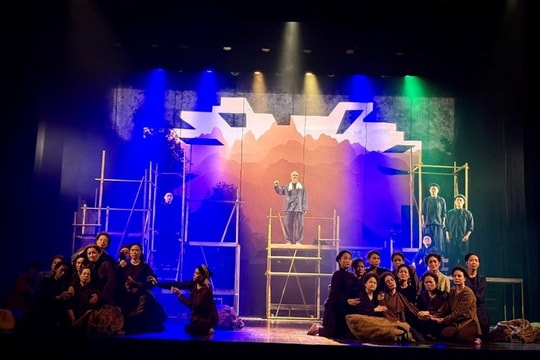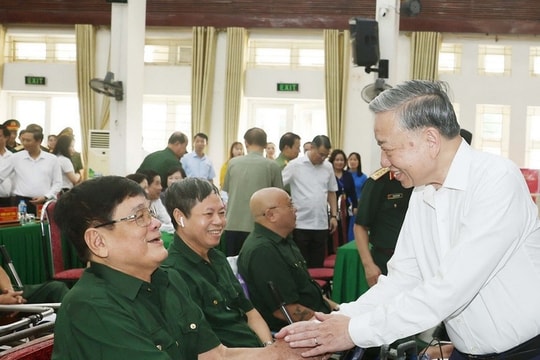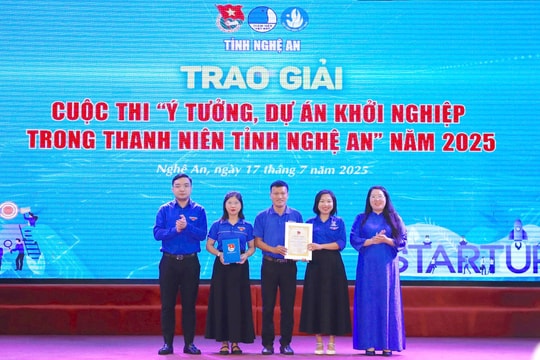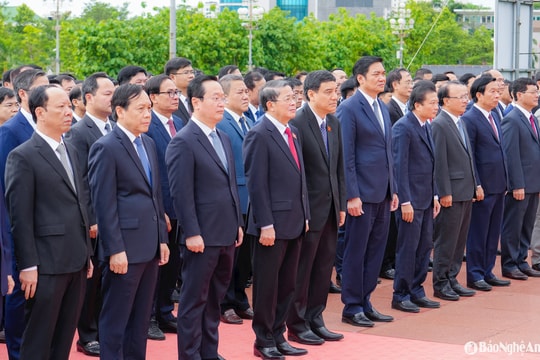Uncle Ho wrote for newspapers in Russia.
(Baonghean.vn) - Since becoming a member of the French Communist Party in 1920, Uncle Ho longed to visit the Fatherland of the great Russian October Revolution that shook the world.
Uncle Ho came to Russia
From Paris, in his mind, Uncle Ho realized that the Vietnamese revolution was a part of the world revolution. He expressed his views and feelings for the Russian October Revolution in many combative articles published in the newspaper L'Humanité "Humanity" of the Central Committee of the French Communist Party, "International Telegraph" of the propaganda agency of the Third Communist International, Le Paria "The Miserable", the newspaper he founded and was the editor-in-chief, secretary of the editorial board, artist, and even directly distributed the newspaper.
The desire to visit Russia became even more intense when in Paris, Uncle Ho read Lenin's "Preliminary Draft Theses on National and Colonial Questions". In the summer of 1923, from magnificent Paris, overcoming a dense network of secret agents, Uncle Ho secretly left Duno station (France) by express train to the port city of Hamburg (Germany) with a travel document in the name of Chen Vang.
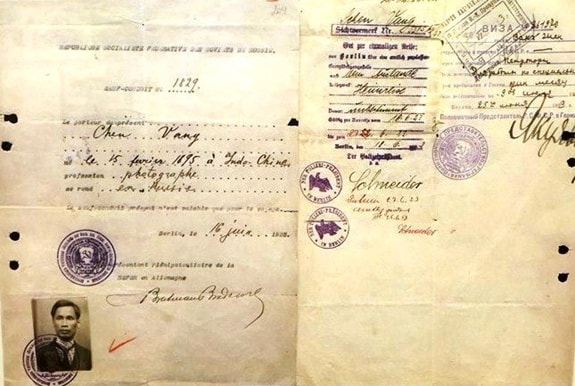 |
| Travel document No. 1829, issued by the Plenipotentiary Representative of the Russian Soviet Federative Socialist Republic in Germany to Nguyen Ai Quoc, alias "Chen Vang", on June 16, 1923. Photo courtesy |
In Hamburg, thanks to the direct intervention of comrade Bradovsky, an officer of the Soviet Embassy, Uncle Ho was allowed to enter the Soviet Union with the following permit content: "Russian Soviet Federative Socialist Republic. Travel permit No. 1829. Bearer: Chen Vang; Born on February 15, 1895 in Indochina. Occupation: Photographer. Departing: Russia". Leaving Germany on June 26, 1923 on a ship named after the German proletarian revolutionary (Karl Lipnech). Uncle Ho arrived at the commercial port of Petrograd on the morning of June 30, 1923.
After arriving in the Soviet Union for 4 months, with his influence and international prestige, Uncle Ho was invited to attend the Congress of representatives of 40 countries that established the "International Peasants' Union" held at the Kremlin with 158 delegates. At the Congress of the world's peasant organization that opened on October 12, 1923, Uncle Ho was elected to the Standing Council with 52 members. The International Peasants' Union held a plenary session on October 17, 1923 and elected a Presidium of 11 members, including Nguyen Ai Quoc.
Founder of International Farmer magazine
With his experience in using the press as an educational and propaganda tool to gather revolutionary forces, after the International Peasants' Congress, when participating in the content of the action program of the Presidium, Uncle Ho proposed to establish a Propaganda Committee and publish the Political Newspaper of the Peasants' International. The Presidium of the Peasants' International accepted Uncle Ho's proposal to publish the magazine "Peasants' International". In early 1924, the magazine "Peasants' International" was introduced to readers, distributed to 40 member countries participating in the Peasants' International. Uncle Ho worked at the headquarters of the Peasants' International located at No. 14, Vadơđơnhĩn Street with the position of monitoring, in charge of, and directing the peasant movement in colonial and semi-colonial countries.
As the founder of the International Peasants' Association, directly directing the content of the "International Peasants' Association" magazine, Uncle Ho participated in organizing the publication content and wrote articles. In issue 1 of the "International Peasants' Association" magazine, Uncle Ho sent 3 articles for publication: "The situation of Vietnamese farmers", "The situation of Chinese farmers", "The situation of North African farmers". At this time, Uncle Ho translated the "International Peasants' Appeal" from English to Vietnamese and sent it to Vietnam, and translated it into French and sent it to the "Humanity" newspaper L'Humanité.
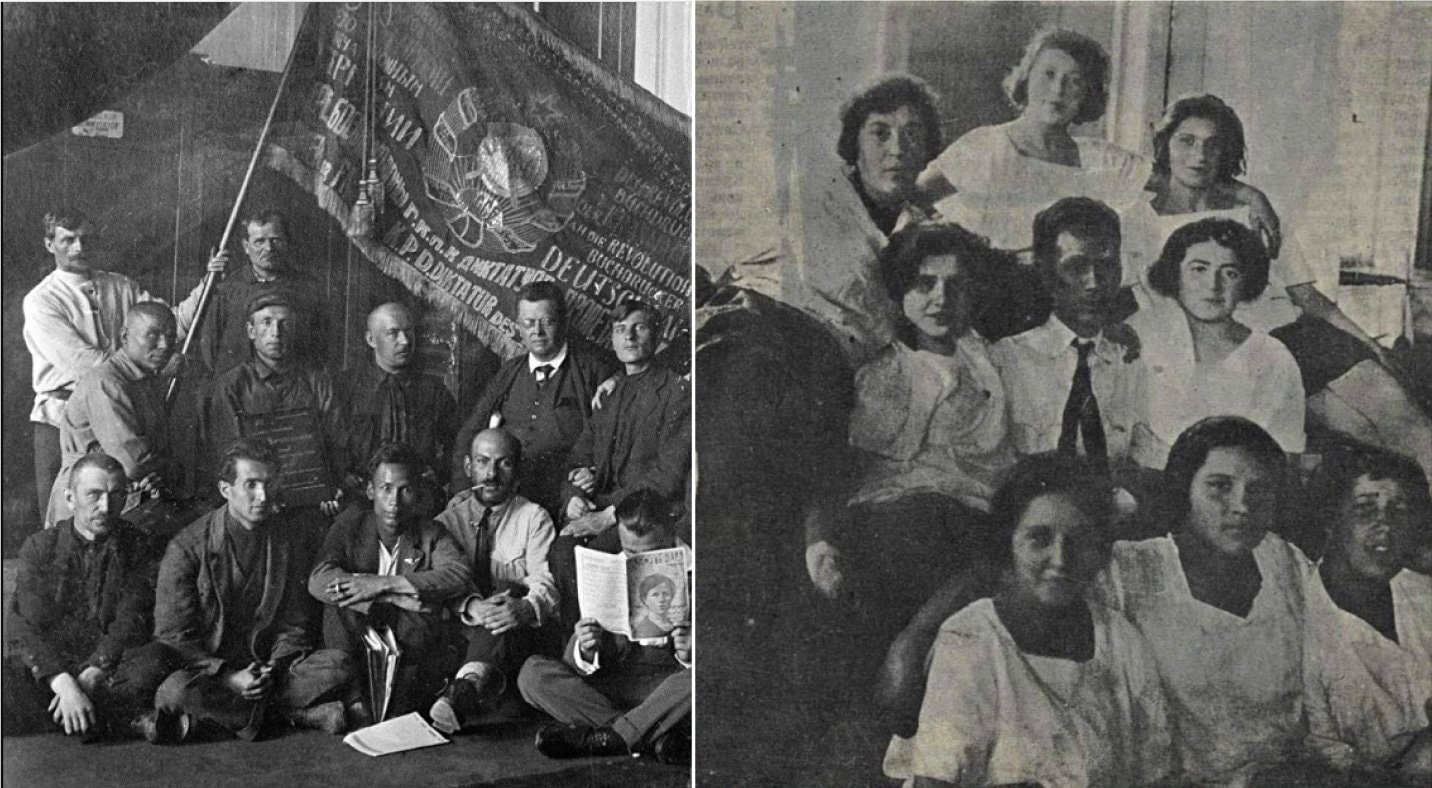 |
| A commemorative photo with members of the Leninsky Zakal Commune, Moscow, October 1924. Photo collected from SMENA magazine, December 1924 (left photo) - Nguyen Ai Quoc and delegates attending the 5th Congress of the Communist International (right photo). |
Uncle Ho's articles published in Red Magazine (theoretical organ of the Third Communist International), "Little Flame" Magazine, "Truth" Magazine founded by Lenin, the Central organ of the Communist Party of the Soviet Union from January to October 1924 all focused on the topic of protecting the rights, national independence, political, economic and social rights of the working class, whose subjects were farmers and workers in India, Algeria, China, Indochina and Tunisia.
Arriving in the Soviet Union at the end of June 1923, Uncle Ho sent a letter to the comrades in the Central Committee of the French Communist Party expressing his criticism of the newspaper "Humanity" for removing the "Forum of the Colonies" column. The letter read, "... Those forums on colonial issues were suddenly removed by the newspaper. Without the means to work and operate, the Research Committee on Colonial Issues was paralyzed. That pleased the major bourgeois newspapers, which often devoted entire pages to propaganda on colonial issues and were always afraid of being corrected and exposed. That especially caused heavy feelings among the people in the colonies... Instead of increasing propaganda, we (referring to the French Communist Party) beat the drum and gave up." And Uncle Ho suggested reopening the "Colonial" forum column in the newspaper "Humanity" so that "... Readers could get acquainted with colonial affairs...".
Struggle for colonial peoples
To have sources of information for writing articles, Uncle Ho took advantage of every opportunity to meet with delegates from 40 countries who came to Moscow to attend the International Peasants' Congress. He often went to the Rumianshev library near the Kremlin, a massive library, the largest in Moscow, to look up documents, enriching his knowledge when writing articles of great generality, orienting and directing the international revolutionary movement with issues specific to the Vietnamese revolution. The articles he wrote for the Communist Party of the Soviet Union, the Communist Party of France and the Communist International III, in addition to their vivid realism, profound analytical ability, sharp writing style, and tight argumentation, were also full of emotion when referring to the fate of the most miserable of the miserable.
In an article about the situation of North African farmers being oppressed and exploited by French colonialists, Uncle Ho cited: “… Tens of thousands of white people rushed to chase away the native farmers to rob their land. In Algeria and Tunisia, French colonialists robbed 1,800,000 hectares of farmers’ land, 2,700,000 hectares of forest, 800,000 hectares of public land. Also in Morocco, they robbed 545,000 hectares of land…” and Uncle Ho concluded the article “… North African farmers will disappear from the earth if the proletariat does not awaken them and come to their rescue…”.
Also at the end of 1923, Uncle Ho was assigned to work in the Eastern Department of the Third Communist International. His field of work in the Eastern Department had a direct relationship with the revolutionary movement in China and Indochina, so his articles and letters sent from the Soviet Union to the Central Executive Committee of the French Communist Party all mentioned the issue of colonial liberation, especially the issue of Vietnam.
The comrades in the “Colonial Union” at Uncle Ho’s request tried every way to transfer the newspapers Le Paria “The Miserable”, L’Humanité “Humanity”, and the Communist Magazine from France to Vietnam. Uncle Ho’s articles published in progressive newspapers in 1923 and 1924 reached Buoi School (Hanoi), Quoc Hoc School (Hue) and Saigon, awakening, encouraging, and attracting generations of Vietnamese youth towards the revolutionary truth of the times, urging them to find a new way to save the country and save the people, despite the poisoning of the ideology of accepting the fate of slavery by French colonialism that the colonial education system had long maintained in the Vietnamese school system.
During a short time in Lenin's country (from June 30, 1923 to September 25, 1924), Uncle Ho made many contributions to the propaganda of the Soviet Russian press system on the issue of colonial liberation. Soviet readers were familiar with the pen name Nguyen Ai Quoc in the newspaper "Nu Lao Dong" (Women's Labor) with a weekly circulation of 60,000 copies, the organ of the Women's Mobilization Committee under the Central Committee of the Russian Communist Party, and the newspaper "Worker" (Worker) of the General Confederation of Labor of the Soviet Union. In the article about “Oriental Women” published in the newspaper “Women Labor”, Uncle Ho denounced the British colonialists for exploiting female laborers in India as follows: “...These mines employ 42,000 women and 1,117 children. It is a disgrace to the 20th century to see women bent over under coal baskets, walking tremblingly but still walking because of hunger, and children aged 12-13 crawling in coal troughs, crawling and pulling coal baskets with their teeth…”.
Also in the newspaper “Nu Lao Dong”, when praising the role and fighting spirit of women, Uncle Ho wrote “… Turkish women participated in defending the country against the invasion of Western imperialism. Indian women rose up against the British rulers. Chinese women participated in the revolution in 1912. Korean women have been fighting for the independence of their country. Japanese women demanded that their Government abolish the law prohibiting women from participating in political activities… In economic life, the “Roses” of the East showed capitalism that they have sharp thorns that hurt very much. Strikes by working women are no longer a rare phenomenon in factories and silk weaving workshops”.
The magazine “International Correspondence”, the propaganda and theoretical organ of the Communist International, in 1924 continuously published many articles with sharp theory, vivid practice, and rich inspiration of Uncle Ho such as: “Indochina and the Pacific”, “What dares French imperialism do”, “The bankruptcy of French colonialism”, “Colonialism”, “The good things of French civilization”, “American lynching”, “Imperialist countries and China”, “The civilizing and murderous campaign”, “Marshal Lyotay and the declaration of human rights”, “Colonialism is condemned”, “The Ku Klux Klan Party”…
To "The Verdict of the French Colonial Regime"
The articles written in the land of Lenin by Nguyen Ai Quoc have the value of illuminating the idea of liberating oppressed peoples in the world, determining the leadership role of the working class as pointed out by Leader Lenin, exposing the rotten nature of colonialism and imperialism, and predicting early the danger of fascism and the disaster it caused on a world scale.
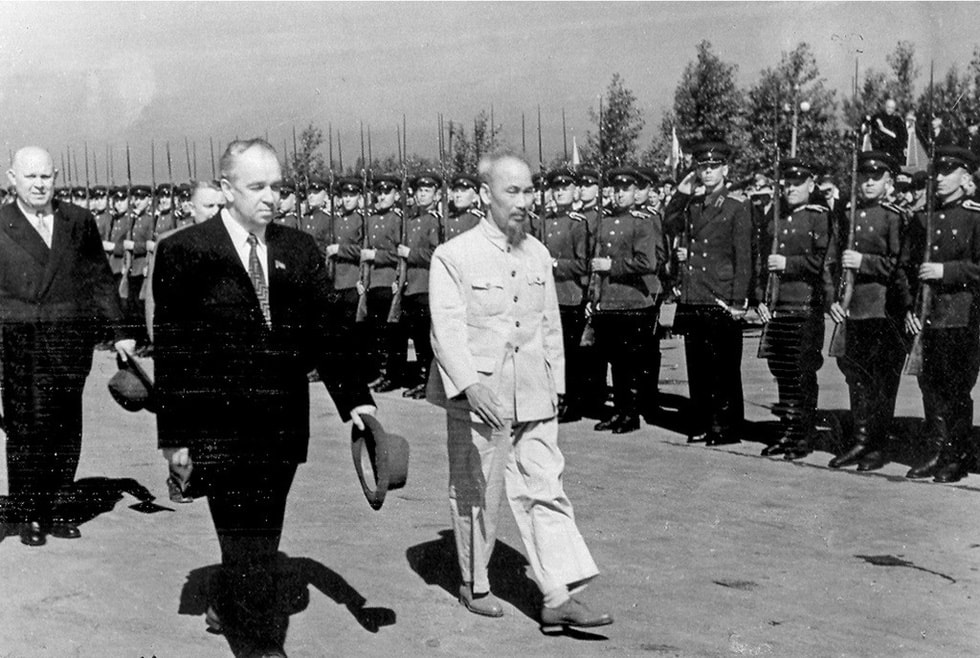 |
| President Ho Chi Minh reviews the Soviet Army's honor guard during the welcoming ceremony for the Vietnamese Government delegation on an official visit to the Soviet Union on July 12, 1955. Photo courtesy |
With precise figures and hot events, Nguyen Ai Quoc analyzed and assessed the development trend of the inevitable revolutionary struggle of the working class, the close relationship between the peasant class and the working class on the path of national liberation and class liberation revolution. A characteristic of the content and theme of his articles, in any genre, Nguyen Ai Quoc always mentioned the social situation, class division, conflicts of the times, progressive development trends, revolutionary capabilities of the working class in colonial countries. And from the political works summarized during his political activities in France combined with the knowledge and theory accumulated during his work at the "International Peasants' Association" and the "Oriental Bureau of the Communist International", Nguyen Ai Quoc completed the famous work "The Verdict of the French Colonial Regime" in Moscow.
The manuscript of the work "The Verdict of the French Colonial Regime" was sent to French Communist comrades in time to be printed at the Paris Labor Publishing House before Nguyen Ai Quoc took on the responsibility of Member of the Eastern Committee, in charge of the Southern Bureau, and went to Guangzhou (China) to direct the revolutionary movement of Southeast Asian countries according to the decision of the Executive Committee of the Communist International on September 25, 1924. And from here, the dawn of the national liberation revolution, initiated by leader Nguyen Ai Quoc, trained, organized revolutionary forces, and founded the Communist Party of Vietnam on February 3, 1930, became the decisive leadership role for the victorious revolution, which began with the earth-shaking Nghe Tinh Soviet (1930-1931), creating the premise for national independence in 1945.

.jpg)

.jpg)
